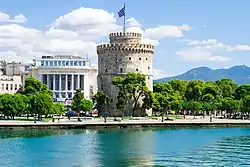Thessalonica
English

The White Tower in Thessaloniki
Etymology
From Latin Thessalonīca, from Ancient Greek Θεσσᾰλονῑ́κη (Thessalonī́kē), named for Thessalonike daughter of Philip II, half-sister of Alexander the Great, and wife of Cassander of Macedonia, from Θεσσᾰλός (Thessalós, “Thessalian”) + νῑ́κη (nī́kē, “victory”), possibly named for her birth on the anniversary of the Battle of Crocus Field in Thessaly.
Pronunciation
- (General American) IPA(key): /ˌθɛsələˈnaɪkə/
Audio (CA) (file)
Proper noun
Thessalonica
- (now especially historical) Alternative form of Thessaloniki, a port city in northern Greece.
Derived terms
Latin
Etymology
Borrowed from Ancient Greek Θεσσᾰλονῑ́κη (Thessalonī́kē).
Pronunciation
- (Classical) IPA(key): /tʰes.sa.loˈniː.ka/, [t̪ʰɛs̠ːäɫ̪ɔˈniːkä]
- (modern Italianate Ecclesiastical) IPA(key): /tes.sa.loˈni.ka/, [t̪esːäloˈniːkä]
Proper noun
Thessalonīca f sg (genitive Thessalonīcae); first declension
- Thessaloniki (a city in Greece)
Declension
First-declension noun, with locative, singular only.
| Case | Singular |
|---|---|
| Nominative | Thessalonīca |
| Genitive | Thessalonīcae |
| Dative | Thessalonīcae |
| Accusative | Thessalonīcam |
| Ablative | Thessalonīcā |
| Vocative | Thessalonīca |
| Locative | Thessalonīcae |
References
- “Thessălŏnīca”, in Charlton T. Lewis and Charles Short (1879) A Latin Dictionary, Oxford: Clarendon Press
- Thessălŏnīca in Gaffiot, Félix (1934) Dictionnaire illustré latin-français, Hachette.
This article is issued from Wiktionary. The text is licensed under Creative Commons - Attribution - Sharealike. Additional terms may apply for the media files.